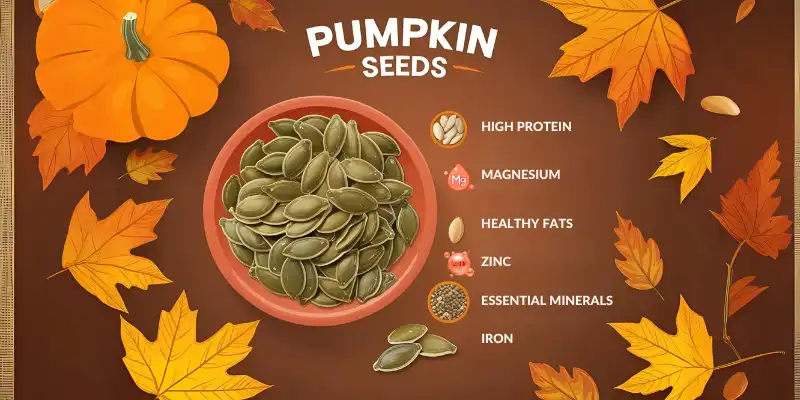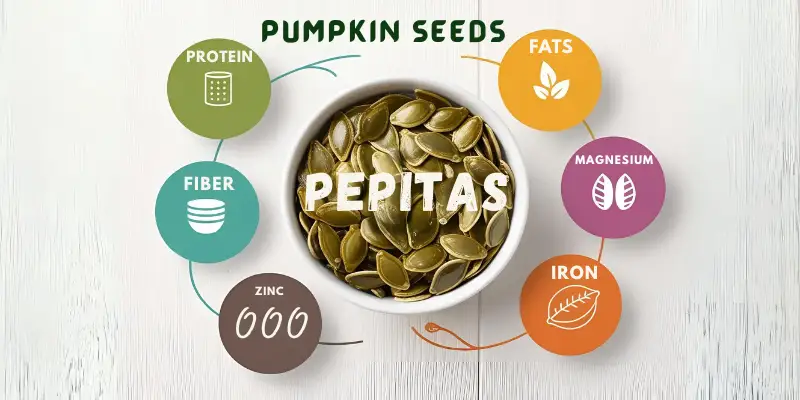Nutritional Value of Pumpkin Seeds: A Crunchy Powerhouse for Your Health
Published: 30 Jan 2026
Hey, health-conscious guys
Did you know that pumpkin seeds are a nutritional powerhouse? These small seeds contain protein, healthy fats, fibre, magnesium, and zinc, offering numerous health benefits. When you explore the dietary facts of pumpkin seeds, you’ll discover why they’re a great addition to any diet, supporting heart health, immunity, and sleep.
I’m Sheila, a botanist with seven years of experience in plant science. In this article, I’ll guide you through the remarkable nutritional value of pumpkin seeds, discussing their impressive nutrient profile and health benefits. We’ll explore everything from their rich magnesium content to their role in boosting immunity.

By the end, you’ll learn the science behind their nutrients and how they can support your well-being. Ready to explore the nutritional secrets of pumpkin seeds? Let’s dive in and unlock their full potential together!
Nutritional Value of Pumpkin Seeds
Pumpkin seeds, known as pepitas, are more than a tasty snack. They have essential nutrients that can boost your health in numerous ways. These small but mighty seeds are an excellent addition to your pantry, offering a combination of plant-based protein, healthy fats, and powerful minerals.

Think about what makes pumpkin seeds so good for you and why you should add them to your diet.
Pumpkin Seeds: Nutritional Highlights
Packed with key nutrients, pumpkin seeds offer a variety of health benefits in every bite:
- Magnesium: Supports heart, muscle, and nerve function.
- Zinc: Boosts immunity and aids in wound healing.
- Iron: Maintains energy levels and supports the production of red blood cells.
- Healthy fats: Rich in omega-6s and monounsaturated fats; great for heart health.
- High in fiber: Promotes digestion and increases satiety.
- Antioxidants: Help fight oxidative stress and support healthy aging.
Pumpkin Seeds Nutrition Facts (Per Serving)
Here’s a detailed look at the nutritional content of pumpkin seeds per serving, so you can easily see how they contribute to your daily intake of essential nutrients.
Let’s break it down!
| Nutrient | Amount (per 1 ounce) | % Daily value |
| Calories | 151 | – |
| Protein | 7g | 14% |
| Fats | 13 g | 20% (mostly healthy fats) |
| Fibers | 1.7g | 6% |
| Magnesium | 150 mg | 37% |
| Zinc | 2.2mg | 14% |
| Iron | 2.3mg | 23% |
Health Benefits of Pumpkin Seed Nutrients
Pumpkin seeds are nutritious and have several health benefits that can enhance your health. These little seeds can improve your mood and immune system.
Let’s explore how their unique nutrient profile can work for you.
Supports Heart Health
- Like the gears of a well-oiled machine, the magnesium and antioxidants in pumpkin seeds help keep your heart in shape.
- These nutrients regulate blood pressure and reduce inflammation, promoting overall cardiovascular health.
- I’ve noticed that adding these seeds to my diet has helped me feel more balanced and energetic throughout the day.
Boosts Mood & Sleep
- Pumpkin seeds are a natural mood booster! Packed with tryptophan, an amino acid, they help your body produce serotonin, a chemical that lifts your mood.
- They aid in melatonin production, helping you sleep more soundly at night.
- I’ve found them to be a calming nighttime snack, especially when I need to relax after a long day.

Muscle Recovery & Energy
- Pumpkin seeds can be your best friend for those who lead an active lifestyle or enjoy regular exercise.
- Their high protein and iron content promote energy and muscle recovery.
- As a veggie eater, I enjoy pumpkin seeds after a workout to refill my body naturally.
Immune System Support
- The zinc and antioxidants in pumpkin seeds play an important role in strengthening your immune system.
- Fighting off harmful invaders helps your body stay healthy and resilient.
- I’ve noticed a difference in my immunity since I added pumpkin seeds regularly to my meals; they’ve helped me feel more energetic and less prone to colds.
How to Eat Pumpkin Seeds
Pumpkin seeds add nutrition to any meal with minimal effort. Whether you want to enhance the flavour or add extra crunch, these seeds can seamlessly integrate into your daily meals.
Here are some easy and delicious ways to enjoy them:
Sprinkle them over salads or soups
- A handful of pumpkin seeds with your favourite salad or soup for a satisfying crunch and a nutritional boost.
- I love topping my salads with them for an extra boost of protein and healthy fats.
Blend into smoothies or energy bites
- Add pumpkin seeds to smoothies or energy bites for an extra boost of protein, healthy fats, and essential nutrients.
- I often blend them into my morning smoothie for an energy-packed start to the day.
Use in baking (muffins, granola bars)
- Add pumpkin seeds to muffins or granola bars for texture and nutrients.
- I often mix them into my granola bars for a healthy, on-the-go snack.
Roast with spices for a savoury snack
- Roast pumpkin seeds with your favourite spices, such as paprika or cayenne, for a savoury, crunchy snack.
- This is my go-to snack when I need something satisfying without guilt.
Stir into yogurt or overnight oats
- Stir pumpkin seeds into yogurt or overnight oats to add crunch and increase your fibre, protein, and healthy fats intake. I like adding them to my overnight oats for a filling and energizing breakfast.
Side Effects of Pumpkin Seeds You Should Know
While pumpkin seeds are nutritious, like most good things, moderation is key. Just as overwatering a plant can do more harm than good, eating too many pumpkin seeds may lead to unwanted effects.
Most people enjoy them without issues, but a few things are worth noting if you add them regularly to your meals.
|
Final Verdict
The nutritional value of pumpkin seeds goes far beyond their small size; they’re a simple, natural way to boost your health with fiber, protein, healthy fats, and key minerals. Whether you sprinkle them on salads or enjoy them as a snack, these seeds can easily become part of your wellness routine.
As a botanist with seven years of hands-on experience, I’ve seen firsthand how incorporating seeds like these into daily meals supports long-term health goals in a natural, sustainable way.
Ready to turn your snacks into superfoods? Try adding pumpkin seeds to one meal today and feel the difference.
Frequently Asked Questions
Are you curious about pumpkin seeds and how they fit into your diet? Here are some common questions health-curious food lovers often ask, answered clearly.
Yes, pumpkin seeds can be a healthy part of your daily diet. They’re rich in fiber, protein, and essential minerals like magnesium and zinc. To avoid excess calories, stick to a moderate portion, about a handful, daily.
A good daily serving is around 1 ounce (about 28 grams or a small handful). This provides a solid dose of nutrients without overdoing it. If you’re just starting, try half that amount and increase gradually.
Pumpkin seeds are rich in fiber and protein, which help you feel full longer and may curb cravings. They won’t magically melt fat, but can support a balanced weight-loss diet. Choose raw or dry-roasted seeds that are not added to salt or sugar.
Yes, in moderate amounts and when age-appropriate. They’re packed with nutrients that support growth, immunity, and brain health. Ensure they’re chewed well or ground up for younger children to prevent choking.
Absolutely! Raw pumpkin seeds, often sold as pepitas, are safe to eat and retain most of their nutrients. You can eat them on their own or in smoothies, salads, or yogurt.
Keep pumpkin seeds in a sealed container in a cold, dry area. For longer freshness, store them in the fridge or freezer. This helps preserve their healthy fats and prevents them from going rancid.
| Reference |
|---|
|

- Be Respectful
- Stay Relevant
- Stay Positive
- True Feedback
- Encourage Discussion
- Avoid Spamming
- No Fake News
- Don't Copy-Paste
- No Personal Attacks

- Be Respectful
- Stay Relevant
- Stay Positive
- True Feedback
- Encourage Discussion
- Avoid Spamming
- No Fake News
- Don't Copy-Paste
- No Personal Attacks





